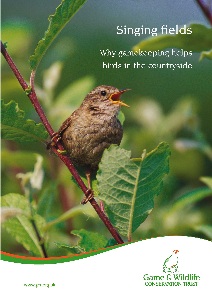|
Autumn becomes spring: Confusion in nature's calendar
AS
trees across the UK are coming into full colour, Nature's Calendar
has received sightings from across the UK of plants flowering in
autumn. These quirks of nature include daffodils in Devon and
Cardiff, primroses flowering across the UK from Surrey and Hampshire
up to Inverness and the Moray Firth. There are crab apple trees
flowering in Nottingham, alder and foxgloves in full bloom in
Somerset, apple blossom in West Sussex and Northamptonshire, and
wild strawberries in Cardiff and Carmarthen. Pond life is
active with recordings including dragonflies mating, reports of live
tadpoles in Fife and young newts in Edinburgh. All of these are
traditionally considered to be spring events, the only question is,
are they really late or really early?
Dr Kate Lewthwaite from the Woodland Trust explains:- "With
such mild weather it seems that some plants have been fooled into
the flowering cycle for a second time. Unfortunately it is unlikely
that the plants will fruit again as it will be too cold. Plants
react to the current weather and as such aren't aware that winter is
just a round the corner. In the case of the tadpoles and dragonflies
the mild conditions have been favourable to allow them to survive."
She continues:- "Autumn seems to be stretching
from summer to Christmas. We've had a bumper crop of blackberries as
early as July and in many circumstances we're still waiting for
trees to go into full autumn colour which is a week or so away.
Nature's Calendar even has reports of hawthorn showing both autumn
leaves and out of season flowers at the same time and elderflowers
still blooming in the hedgerows"
Autumn is nature's way of treating us to one last burst of colour
before the winter cold sets in. Trees across the UK are now going
into full colour creating displays of wonderful yellow, gold and red
shimmering leaves for all 'leaf peepers' to see. People all
across the world in Japan and the USA flock to see the spectacle,
and we've got our own on our doorstep. While you are out 'leaf
peeping' you could help take part in the Nature's Calendar
project run by the Woodland Trust. The project - the world's leading
study into phenology - researches how climate change is affecting
our seasons and wildlife by analysing data collected from thousands
of volunteers across the UK.
To see these wonderful oddities of nature or if you'd just like to
go and enjoy striking autumn colour where you live, or to become a
Nature's Calendar recorder visit
www.naturescalendar.org.uk and follow the autumn
woods link to find a wood near you. Get out now before we're all
sweeping up those leaves ready for winter. |
New
report identifies that gamekeepers help wild birds to thrive

THE
shooting season is underway but the role of gamekeepers in
conserving many non-gamebirds is not widely understood. Many
songbirds and other bird species have dramatically declined in
recent decades but a new report shows that where land is managed by
gamekeepers many species thrive.
The report 'Singing fields' compiled by Dr Stephen Tapper,
director of policy and public affairs with the Game & Wildlife
Conservation Trust (formerly The Game Conservancy Trust), highlights
the contribution that gamekeepers have made in protecting many of
our most threatened birds from starvation and attack from generalist
predators such as foxes, magpies and crows. 'Singing fields'
draws on recent research by the Trust's own wildlife biologists as
well as other experts and assesses the evidence that shows the
species that do and do not benefit from game management activities,
such as predator control, habitat creation and feeding techniques.
Dr Tapper explains:- "Gamekeepers manage large parts of the
countryside for pheasants, partridges and grouse and in so doing,
create conditions that benefit other birds too. Game management
delivers a very considerable net conservation gain and without this
conservation work, carried out by the 3,000 gamekeepers working in
our countryside, the prospects for many declining wild bird
populations would be much worse."
A 10-year study on the Trust's Allerton Farm project at Loddington
provides compelling evidence to support this view and shows how
farmland birds benefit from game management. Over the study period
habitat improvement and predator control boosted the number of wren
(from 47 to 141 pairs), dunnock (46 to 144 pairs), blackbird (66 to
143 pairs) and song thrush (14 to 56 pairs). The most noticeable
beneficiaries of this regime were the resident seed-eating finches
who took advantage of the pheasant feeders and set-aside cover
crops. Interestingly, many of these species declined after predator
control was stopped in 2002. In the uplands, gamekeepers burn
heather and control crows, foxes and stoats which provide ideal
nesting areas for waders. Lapwings are at least twice as common on
grouse moors. On the North Pennine moors there are at least 700
pairs of golden plover and 3,900 pairs of curlew. Raptors like
merlin also thrive and occur at much higher densities on grouse
moors than on other moors.
Dr Tapper concludes:- "Gamekeepers make an often unappreciated
contribution to the richness of bird life in the countryside.
Intensive farming and forestry means that wild birds often struggle
to find shelter and food in modern crops. Conservation is not just
about creating nature reserves. It must also be about economic land
use and how this can be made to support increased biodiversity. Game
management for pheasants, partridges and grouse is a good example of
this as it supports a variety of other species as well." |

